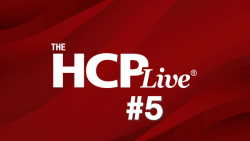
OR WAIT null SECS
Frederic Lavie, MD, PhD: Guselkumab Provides Robust Improvements in Pain Among Patients with PsA
Data showed a significant reduction in pain for patients with psoriatic arthritis and inadequate response to TNF treated with guselkumab compared with placebo.
The inspiration for the Cosmos phase 3b study came from discussions that investigators, including Frederic Lavie, MD, PhD, head of Global Medical Affairs Rheumatology at the Janssen Pharmaceutical Companies of Johnson & Johnson, had with providers about the challenges of treating pain in patients. Pain, he said, is often the most difficult symptom to address, even when disease activity appears controlled.
In an interview with HCPLive, Lavie explained that although the efficacy of guselkumab was previously proven in bio-naïve patients with psoriatic arthritis (PsA), there was an uncertainty about its effectiveness in patients who still experienced high pain levels after showing inadequate response to ≥ 1 tumor necrosis factor (TNF) blockers.
Therefore, this trial, presented at the 2024 European Congress of Rheumatology (EULAR), compared guselkumab with placebo in patients who had inadequate response to TNF. Patients were randomized to receive either guselkumab or placebo at baseline. Placebo-treated patients were then crossed over to guselkumab at week 16 or 24.
The drug’s impact on pain was evaluated using various methods, including the Visual Analog Scale (VAS), the 36-Item Short Form Health Survey (SF-36) bodily pain questionnaire, and the tender joint count.
The data showed a significant reduction in pain for patients treated with guselkumab compared with placebo. Using the VAS, investigators observed meaningful pain improvement as early as week 8. Similar results were seen with the bodily pain questionnaire, and the tender joint count also showed significant differences by week 12, although it was more variable due to subjective factors. The improvements were maintained over time, with 88-91.3% of patients showing sustained pain reduction at week 48.
Lavie noted a limitation of the study was its post hoc design. Although this can introduce a statistical bias, it also provides valuable insights into drug effectiveness and helps refine its use.
“It's a continuous work,” Lavie concluded. “Every time we go to congresses—such as EULAR—we see the progress that is made, but we also see the magnitude of the unmet needs. This is what is motivating us every time we wake up in the morning: to do better for the patients.”
This transcript was edited for clarity.
Disclosures: Lavie is the head of Global Medical Affairs Rheumatology at Janssen.


